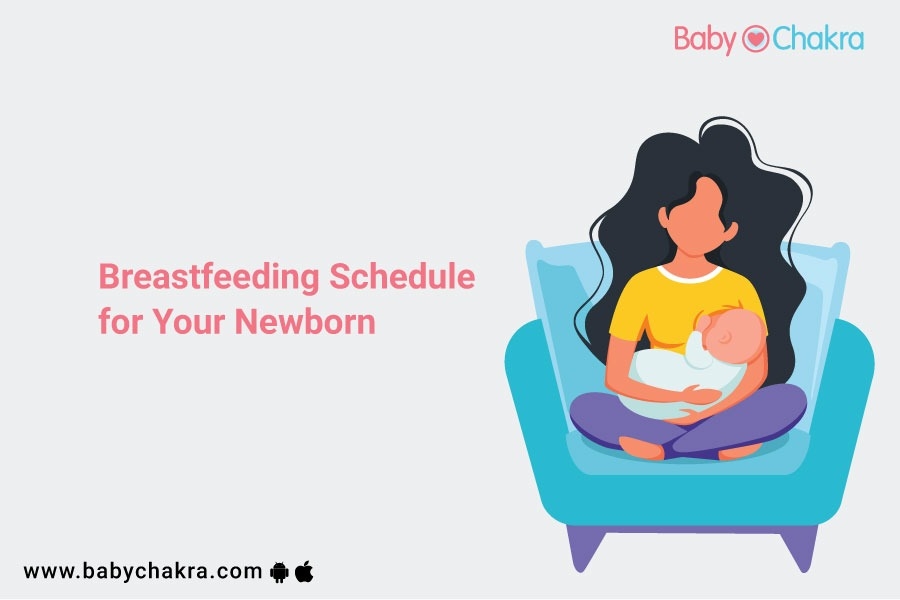
Newborn Schedule For Breastfeeding
19 Oct 2021 | 5 min Read
Varsha Satyan
Author | 1 Articles
Medically reviewed by
Dr Shweta Upadhyay
On average, a newborn baby eats approximately every 2 to 3 hours once round the clock. That becomes around 8 to 12 times in 24 hours. Newborns have a small fist-sized stomach that gets empty after a poop or a pee.
Moreover, breast milk is easily digested; thus, a newborn baby needs to be fed frequently. But how long to breastfeed a newborn and what about the newborn breastfeeding schedule, we’ve got you covered with all the breastfeeding queries on your head. So, let’s dive into it. Keep on reading.
| Sometimes, you may notice that your baby wants lots of short feeds over a few hours. And post, he sleeps at a stretch for long hours. This pattern of feeding is called cluster breastfeeding. |
How Much Breast Milk Does A Newborn Need At Each Feeding?
When the infant is three days old, he or she should receive around 15 mL (1/2 ounce) every feeding. By the time the infant gets four days old, he or she should get roughly 30 mL (1 ounce) during every feeding. The infant eats roughly 45 ml (1 12 ounces) every meal on the sixth day.
Moreover, during the first month, newborns should be breastfed 8–12 times each day. Because breast milk is quickly absorbed, babies frequently get hungry. During the first several weeks, frequent feedings can assist to boost milk production. Your kid will most likely get fed 7–9 times per day by the time he or she is 1–2 months old.
Planning Newborn Schedule For Breastfeeding?
In order to build an appropriate milk supply, you should plan to feed a baby every 2-3 hours around the clock for the first 2-3 weeks of post-pregnancy. It is normally safe to begin establishing a plan once this time period has passed.
Tips To Make Breastfeeding A Newborn Easier
Here are some guidelines that every new mother can follow to ensure proper breastfeeding for newborns.
Nurse On-Demand
The recommended way to feed your breastfed baby is on demand. Instead of sticking to a strict newborn breastfeeding schedule, it’s best to stay flexible and feed your little one whenever they appear hungry. Breastfeeding your newborn when they show signs of hunger provides them with a sense of comfort and security. On-demand feedings also help you increase your breast milk supply to meet your growing newborn’s nutritional needs. Then, a more routine newborn schedule may naturally evolve as your baby gets older. You might even get to sleep longer at night.
Watch For Hunger Cues
Babies are unable to use words to let their mothers understand that they’re hungry, but they are still smart enough to tell you that it’s time to eat. A newborn is ready to have milk when they are:
- Awake, alert, and active
- Making sounds
- Moving lips together
- Moving their head from side to side
- Pulling up their legs
- Putting their head on your chest while being held
- Rooting
- Sticking out their tongue
- Sucking their hands
Your baby may show you some or all of these signs of hunger. Initially, it can be difficult for you to identify, but as the days will pass by, you’ll begin to recognize them more easily.
Stop When Your Baby Is Full
Initially, breastfeeding your newborn as long as they stay is good. Continue to breastfeed until you notice the signs indicating your child is content. This way, you can ensure your baby is getting enough breast milk at each feeding. Plus, it is said that breastfeeding the baby longer stimulates milk production and helps to build up breast milk supply.
Some Interesting Facts About Breastfeeding
Here are some interesting facts about breastfeeding to keep you motivated.
- Breastfeeding burns 500-600 calories each day on average. As a result, some mothers may lose weight without doing any more activity.
- Breast milk includes live cells, stem cells, which differentiate into body cells such as the brain, heart, kidney, and bone tissue.
- During breastfeeding, your brain releases the chemicals prolactin and oxytocin, which help you bond with your baby while also reducing stress and anxiety at the same time.
- Breastfeeding reduces your baby’s chances of ear infections, respiratory infections, gastroenteritis, and necrotizing enterocolitis, which are all frequent childhood disorders.
If at any time, you feel that your newborn is not getting enough breast milk or is not breastfeeding well, you should contact your paediatrician. The doctor will check your baby to make sure he is gaining weight regularly. The doctor can also answer your questions and help you feel more confident and comfortable about the newborn breastfeeding schedule.
Related Articles:
Breastfeed With Lactation: Did you know that induced lactation had made it possible for all moms who may have discontinued breastfeeding to bond with their babies over breastfeeding. Lactation expert Dr Manisha Gogri explains more in this article! Check out now!
Why Inability To Breastfeed?: Inability to breastfeed doesn’t mean the world’s end! Mom Stars share- Why! Click here!
FAQs On Breastfeeding: Here, we got you covered with some major FAQs on breastfeeding if you’re a new mom! Check them out here!
A


Related Topics for you
Suggestions offered by doctors on BabyChakra are of advisory nature i.e., for educational and informational purposes only. Content posted on, created for, or compiled by BabyChakra is not intended or designed to replace your doctor's independent judgment about any symptom, condition, or the appropriateness or risks of a procedure or treatment for a given person.
